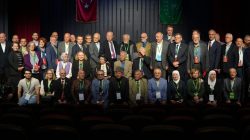
Sukhum/Agency Caucasus – Abkhazia, a country stricken with a demographical crisis since its occupation by Russia in the 19th century, seems to be thrown into a further crisis with the gradually decreasing annual number of births in the country.
The Abkhazian Economic Development Party, or AEDP, organized round-table talks in a bid to draw attention to the demographical crisis which is currently facing Abkhazia. Reporters learnt from the talks that annual number of births was decreasing by 47 on average, with the only exceptional increase in the year 1995.
AEDP’s President Beslan Butba; his colleagues Beslan Barateliya, Ilya Gamisoniya ad Gennadi Ardzinba; Oled Damenia, who is a representative of Aytayra as well as President of the Center for Strategic Researches; Gennadi Alamia, who is Secretary-General of the Association of World’s Abkhaz-Abkhazin People; Daur Arshba, who is a member of the parliament as well as President of the Forum for National Union; Astamur Taniya, who is Secretary of this organization; Daniil Ubiriya, who is a member of the Movement of United Abkhazia as well as Vice President of the Civil Parliament; Yakub Lakova, who is President of the Abkhazian People’s Party and some journalists attended a seminar by Barateliya, who is also an economist.
Barateliya put the number of births of the year 1995 at 2679. "There has been a stable decrease in the annual number of births over the past years since it last increased in 1995. This has been a universal situation. There is an average decrease by
Schools face the threat of closing down
The first 11 months of 2007 saw a number of 848 male and 811 female births, said Barateliya. "If this goes on like that, the annual number of births in Abkhazia will be around
Families should have at least 3 kids
Barateliya also pressed for the need on the part of Abkhazian families to have at least three kids if there is to be a concrete demographic growth. "One thing behind the bad demographics of Abkhazia is the absence of families with many kids while the other thing is the huge number of unmarried couples. Albeit the absence of official statistics, it is apparent that there are many unmarried couples. And we have come to view families with three kids as the ones with many kids. This is not a problem that can be solved in a few years; however, a resent survey has given us hope that many Abkhazians feel prepared to have three or four kids. The survey tells us that most people tend to link the cause behind demographic fall to economic factors such as unemployment and low income. The women of developed countries tend to find it right to have one or two kids. The women of Abkhazia are, however, prepared to have three kids. This shows that unlike many developed countries, Abkhazia still has the potential for demographic growth; however, low family incomes do not allow this to happen. Many women are prepared to have three and more kids if they are paid three thousand dollars in their first births and acknowledged certain rights in later."
Return from Diaspora is a must
Astamur Taniya, Secretary of the Forum for National Union, described the nation’s demographic situation as ‘severe’ and added: "We don’t have exact data about migration and return from Diaspora. Maybe it would be a good idea to have a funding for maternity. Even the birth propaganda is important."
Daiila Ubiriya, who attended the seminar as a member of the Movement of United Abkhazia, said that it could be a good idea to push for more births if families got financial aid from the state. Yakub Lakoba, President of the Abkhazian People’s Party, stressed the need to carry out work so that more returns from the Abkhazian Diaspora could be possible: "The demographic question is impossible to solve without returns from abroad."
Gennadi Alamia said that the question of population should definitely be dealt with at state level: "However, non-governmental organizations should also be formed so that they can encourage families to have more kids." Daur Arshba said words that stressed the need on the part of government to focus on demographics, defense and education. APSNS/ÖZ/FT
[ssba]




